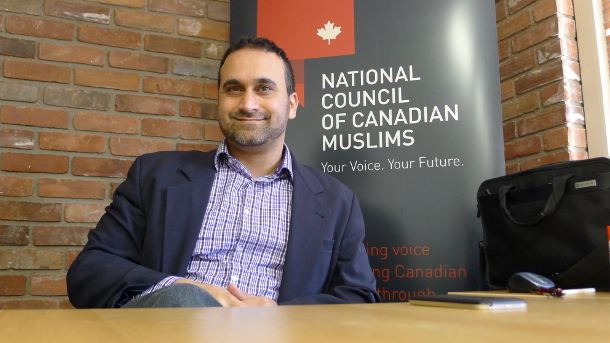A series of Conservative Party ads that repeat terrorism propaganda and denounce some Muslim religious practices could counteract anti-terrorism efforts, says the director of a Muslim advocacy group.
This week, the Conservative Party Facebook page placed a post that quoted propaganda from the Somali terrorist group El-Shabaab, which appeared to encourage radicals to attack West Edmonton mall.
The message features a masked man with the El-Shabaab propaganda and added text saying Canada is under threat and needs protection.
"It's counterproductive," said Ihsaan Gardee, the executive director of the National Council of Canadian Muslims, a non-partisan group that advocates for equality for Muslims.
Gardee said the ads conflate Islam with terrorism, driving a wedge between Muslims, law enforcement and broader society.
"Using this kind of rhetoric undermines the efforts of security agencies," Gardee said.
The El-Shabaab ad is the most recent in a series of aggressive advertisements by the Conservatives.
Last month, an ad on the party's official site took on the issue of the niqab, a religious veil worn by some Muslim women, which covers most of the face. An Ontario woman won a legal battle to wear her niqab during a citizenship ceremony. But the Conservative government is appealing that decision.
"Not the way we do things here," the Conservative message says referring to the woman's desire to wear a niqab during the ceremony.
The ad appeared around the same time that Immigration Minister Chris Alexander expressed the same sentiments in a fundraising letter.
The party also came under criticism in January, when, shortly after the Charlie Hebdo attacks in Paris, the Conservative's website ran comments from Harper that criticized the Paris attacks on the same page that had a donate button. The party eventually took down the button.
No link to Hamas
Last year, Gardee's group launched a lawsuit against Harper after a communications staffer said the advocacy group had links to Hamas, which Canada has labelled a terrorist organization. Gardee said there is not a "shred of evidence" to back up the claim. The case is still before the courts.
Gardee said the ads risk driving a wedge between Muslim groups and law enforcement agencies, and could lead to a reluctance among Muslims to work with agencies to prevent radical extremism. Muslim Canadians take this issue very seriously, he added.
"It's harmful in that it further alienates communities across Canada who are really working on the front lines to tackle the radicalization of violent extremists," Gardee said. "It's a battle for hearts and minds."
Devout Muslims in particular are an effective source to help law enforcement agencies because they have an understanding of the religion beyond the "cut and paste" interpretations used by violent extremists, Gardee said.
He said the Conservative's ads also lend credibility to extremists by giving them momentum and status with people who may be at risk of becoming violent.
"They're also able to use that to attract and recruit new people," he said. "They're able to say 'look, even our so-called enemy says what we're doing is jihad.'"
Instead, Gardee said the government should label violent extremists as criminals and murderers -- and leave out the religious aspect.
The Conservative campaign tactic also makes it harder for mosques and Muslims organizations to fight radicalization at a grass roots level.
For example, one way that mosques fight extremists is to offer a safe space for Muslims to talk openly, free from judgment.
If someone brings up a grievance or speaks in a way that concerns the others they can challenge the person's ideas and try to neutralize the situation to help prevent them from becoming dangerous, or call the police.
Meanwhile, the director of an American Muslim advocacy group says political attacks on Muslims in the United States have discouraged religious organizations from reaching out to the community. Corey Saylor, the National Legislative Director of the Council on American-Islam Relations, which is based in New Jersey, said states that have passed laws that target Muslims -- such as pre-emptive bans on Sharia law -- have contributed to a rise in prejudice against Muslims.
"It's made people in many ways fearful," Saylor said. "There's [also] been a significant problem with over broad surveillance of mosques."
In 2009, numerous mosques in California collectively threatened to stop cooperating with U.S. authorities after complaints that undercover agents were spreading misinformation and pressuring members of the mosque to become informants.
Due to stories like that, people aren't having conversations in mosques for fear of being seen as a potential terrorist. That's affecting the ability to talk about how to stem radicalism, Saylor said.
Meanwhile, vilification of Islam has made some Muslims fear for their safety here in Canada, according to Gardee.
He thinks the advertisements are a political effort to draw attention away from a sluggish economy. Canadians should be able pick up on that, he said.
"Overall, the sentiment I'm hearing is a lot of confidence in our fellow Canadians that they will see through this and see it for what it is," he said. "A cynical, populist and pandering ploy based more on electioneering calculus than on principle or practicality." ![]()
Read more: Rights + Justice, Politics















Tyee Commenting Guidelines
Comments that violate guidelines risk being deleted, and violations may result in a temporary or permanent user ban. Maintain the spirit of good conversation to stay in the discussion.
*Please note The Tyee is not a forum for spreading misinformation about COVID-19, denying its existence or minimizing its risk to public health.
Do:
Do not: